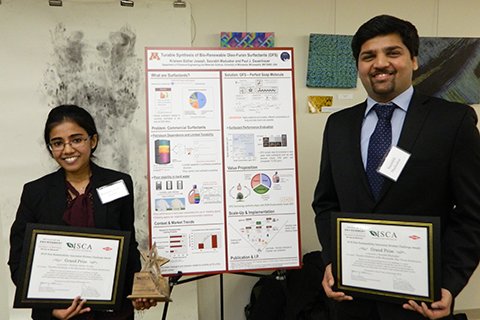CSE grad students win Dow sustainability competition with 'perfect' soap molecule

$10,000 first prize recognizes and rewards students and universities for innovation and research
MINNEAPOLIS / ST. PAUL (01/06/2017) — Two University of Minnesota College of Science and Engineering graduate students who created a soap molecule made from renewable materials have won the $10,000 first prize in the Dow Sustainability Innovation Student Challenge Award competition held recently at the University of Minnesota Institute on the Environment (IonE).
The award, made possible by a collaboration between IonE and the Dow Chemical Company, recognizes and rewards students and universities for innovation and research that encourages and promotes sustainable solutions to the world’s most pressing social, economic and environmental problems. The competition is open to full-time graduate and professional students enrolled at all campuses of the University of Minnesota.
This year’s award was presented to Kristeen Esther Joseph, who developed the molecule, and Saurabh Maduskar, who worked on biomass conversion processes as part of the competition. Both are chemical engineering Ph.D. candidates in the University’s College of Science and Engineering.
Most detergents are made from petroleum and are not biodegradable. Additionally, they require added chemicals to be effective in hard water, some of which are hazardous to natural environments and can be toxic to humans. The new soap molecule works in hard water and is made from renewable biomass and natural oils, such as corn stover and soybean oil, respectively. They call it an oleo-furan surfactant, or OFS.
“OFS technology can help make superior, simple and sustainable detergents,” said Joseph. “The surfactant made using sustainable biorenewable resources leads to a superior molecule that works well in extreme hard water conditions and helps to reduce the number of chemicals in detergents.”
The runner up, Xin Zhang, a Bioproducts and Biosystems Science, Engineering and Management Ph.D. candidate took home $2,500 for her project, Economical Production of Sustainable Fertilizers from Animal Manure. Animal manure contains high levels of phosphorus that, when used as fertilizer, can leach into water bodies and increase eutrophication. Zhang’s research uses electrochemical technology to economically reduce the phosphorus level in liquid manure.
Other finalists were:
Maria Kristine McClintock (Chemical Engineering), Joahanna Aquino Macaranas and Lindsay Michelle Johnson (Chemistry) — Production of novel polymers from fermentation of lignocellulosic feedstocks
Erik Anderson (Bioproducts and Biosystems Science, Engineering and Management) — Scum to biodiesel: The economic rendering and conversion of waste organics to fuel
Vu Nguyen and Kory Jenkins (Mechanical Engineering) — Bio-inspired peptide with controlled microstructures for piezoelectric devices
Kanav Khosla (Mechanical Engineering) — Development of a universal platform for aquatic germplasm cryopreservation for species conservation
Han Zhang, Neel Rangnekar and Nitish Mittal (Chemical Engineering) — Sustainable, low-cost and scalable membranes with applications in chemical- and bio-based refineries
Cristiano Reis and Tanner Barnharst (Bioproducts and Biosystems Science, Engineering and Management) — Application of artificial lichens in agricultural and feed systems
Mohit Sinha (Electrical Engineering) — Virtual oscillator control for low-inertia microgrids
